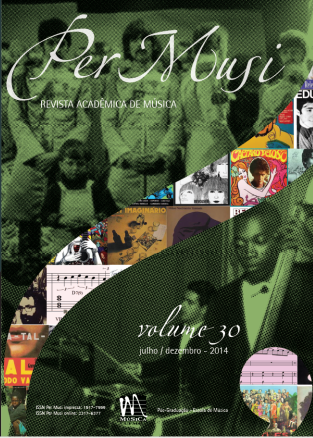O coletivo anônimo e a trama dos gêneros
subjetivações plurais e intertextualidade no Brasil dos anos 1960
Palavras-chave:
ntertextualidade na MPB e na Tropicália, Subjetividade na música, Discurso musical e gênero musicalResumo
Este ensaio destaca a pouco compreendida pluralidade de gêneros musicais na MPB e na Tropicália da década de 1960, relacionando-a aos abalos vividos no período. Nesta pesquisa etnomusicológica, gêneros musicais foram compreendidos como discursos e diferentes gêneros foram percebidos como os discursos de diferentes grupos sociais e culturais. Investigando este fenômeno através do conceito de intertextualidade, analisou-se como identidades culturais erigidas em torno de gêneros delimitados foram desconstruídas pela ruptura de fronteiras entre os gêneros.
Referências
CASTORIADIS, Cornelius. A instituição imaginária da sociedade. São Paulo: Paz e Terra, 1991. Título original: Institution imaginaire de la société.
DUNN, Christopher. Resenha de: Araújo, Paulo César de. Eu não sou cachorro, não: música popular cafona e ditadura militar. In: Luso-Brazilian Review, v.40, n.2, p.148-150, 2003.
JABOR, A. Glauber Rocha: cineasta e pensador do Brasil. In: DUARTE, Paulo Sergio e NAVES, Santuza Cambraia (orgs.). Do samba-canção à Tropicália. Rio de Janeiro: Faperj/Relume-Dumará, 2003.
Kristeva, Julia. Julia Kristeva interviews. GUBERMAN, Ross Mitchell (ed). New York: Columbia UP, 1996.
______. La révolution du langage poétique; l’avant-garde à la fin du XIXe siècle: Lautréamont et Mallarmé. Paris: Éditions du Seuil, 1974.
______. Revolution in poetic language. Trans. Margaret Waller. New York: Columbia UP, 1984.
______. The subject in signifying practice. Semiotexte, v.1, p.19-26, 1975.
LACLAU, Ernesto; MOUFFE, Chantal. Hegemonía y estrategia socialista: hacia una radicalización de la democracia. Madrid: Siglo XXI, 1987.
MIDDLETON, Richard. Studying popular music. Milton Keynes: Open UP, 1990.
NEDER, Alvaro. A invenção da impostura: MPB, a trama, o texto. In: DINIZ, J.; GIUMBELLI, E.; NAVES, S. (Org.). Leituras sobre música popular: reflexões sobre sonoridade e cultura. Rio de Janeiro: 7 Letras, 2008.
______. MPB: identidade, intertextualidade e contradição no discurso musical. Revista Brasileira de Estudos da Canção, v.1, p.1, 2012a.
______. O enigma da MPB e a trama das vozes: identidade e intertextualidade no discurso musical dos anos 60. 2007. 487f. Tese (Doutorado em Letras)– Departamento de Letras, Pontifícia Universidade Católica do Rio de Janeiro, Rio de Janeiro, 2007.
______. “Parei na contramão”: faixas cruzadas na invenção da MPB. Estudos Históricos, Rio de Janeiro, v.25, n.49, p.50-70, 2012b.
NOGUEIRA, Ana Maria de Moura. Depoimento ao autor, 2005.
SMALL, Christopher. El musicar: un ritual en el espacio social. In: Transcultural Music Review, v.4. Disponível em <http://www.sibetrans.com/trans/trans4/small.htm> (Acesso em 4 de Maio, 2007), 1999.
__________. Music of the common tongue: survival and celebration in Afro-American music. New York: Riverrun, 1987.
STAAL, A.H.C. (org.). Zé Celso Martinez Corrêa. Primeiro ato: cadernos, depoimentos, entrevistas (1958-1974). São Paulo: 34, 1998.
VELOSO, Caetano. Verdade tropical. São Paulo: Companhia das Letras, 1999.
Downloads
Publicado
Edição
Seção
Licença

Este trabalho está licenciado sob uma licença Creative Commons Attribution 4.0 International License.

Exceto onde está indicado, o conteúdo neste site está sob uma Licença Creative Commons - Atribuição 4.0 Internacional.












